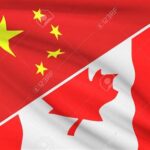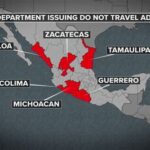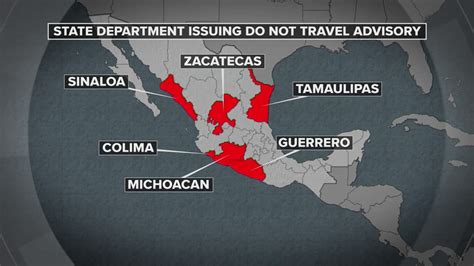
Canadians should exercise a high degree of caution when traveling to the United States due to varying state laws, including those concerning marijuana and LGBTQ+ rights, the Canadian government has warned. The updated travel advisory, issued this week, highlights potential legal and social differences that could impact Canadian travelers.
The advisory, posted on the Canadian government’s website, urges citizens to be aware of state and local laws that may differ significantly from Canadian laws, cautioning that “laws and practices can vary significantly from one jurisdiction to another.” The warning specifically references the differing legal status of cannabis and protections for LGBTQ+ individuals as potential areas of concern. While the advisory is not new, its continued presence underscores the Canadian government’s ongoing concern about the potential challenges Canadians may face south of the border.
The advisory elaborates on several potential issues that could arise for Canadian travelers in the U.S. One prominent area of concern is the legal status of marijuana. While cannabis is legal in many U.S. states, it remains illegal at the federal level. This discrepancy can create confusion and potential legal issues for Canadians who may inadvertently violate federal laws. The Canadian government cautions that “possessing cannabis, even in jurisdictions where it is legal, could lead to your arrest and prosecution by U.S. federal authorities.” The advisory further warns that previous cannabis use, even if legal in Canada, could be grounds for denial of entry into the United States. This highlights the need for Canadians to be extremely cautious about cannabis use before and during their trips to the U.S.
Another significant focus of the advisory is the protection of LGBTQ+ rights. The Canadian government points out that protections for LGBTQ+ individuals vary widely across different U.S. states. “Some states have laws and policies that may affect 2SLGBTQI+ persons. Laws and practices can vary significantly from one jurisdiction to another,” the advisory states. This is particularly relevant given the increasing number of states that have enacted laws perceived as discriminatory towards the LGBTQ+ community. For example, some states have laws restricting transgender individuals’ access to healthcare or limiting their participation in sports. Canadians who are members of the LGBTQ+ community are advised to research the specific laws and policies of the states they plan to visit to avoid potential discrimination or harassment. The advisory suggests consulting resources such as LGBTQ+ advocacy organizations to gain a better understanding of the local legal landscape.
Beyond these specific concerns, the travel advisory also broadly advises Canadians to be aware of the potential for differences in laws and social norms. This includes everything from drinking ages and traffic laws to cultural expectations and social customs. The Canadian government emphasizes the importance of researching local laws and customs before traveling to any part of the U.S. to avoid inadvertently violating laws or causing offense. The advisory suggests consulting travel guides, government websites, and other reliable sources of information to gain a better understanding of the local environment.
The Canadian government’s decision to maintain this travel advisory reflects a broader trend of increasing awareness of the potential risks associated with international travel. As the world becomes more interconnected, it is increasingly important for travelers to be informed about the laws, customs, and social norms of the countries they plan to visit. Travel advisories serve as a valuable resource for travelers, providing them with the information they need to make informed decisions and stay safe while abroad. By highlighting potential risks and providing practical advice, travel advisories help travelers to minimize the chances of encountering problems and maximize their enjoyment of their trips.
The U.S. is by far the most popular international destination for Canadian travelers. Millions of Canadians cross the border each year for tourism, business, and personal visits. The close proximity and strong cultural ties between the two countries make the U.S. an attractive destination for Canadians of all ages and backgrounds. However, the potential for legal and social differences to create challenges for Canadian travelers cannot be ignored. The Canadian government’s travel advisory serves as a reminder that even in a country as familiar as the U.S., it is important to be aware of the potential risks and to take steps to mitigate them.
Furthermore, the advisory notes that attitudes toward certain issues, such as race and gender, may differ significantly between Canada and the U.S. Canadians are advised to be aware of these differences and to exercise caution when discussing sensitive topics or engaging in activities that could be misinterpreted. The advisory also warns of the potential for hate crimes and other forms of violence, particularly against members of minority groups. Canadians who are members of racial, ethnic, or religious minorities are advised to be extra vigilant and to take steps to protect themselves from potential harm.
The Canadian government’s travel advisory is not intended to discourage Canadians from traveling to the U.S. Rather, it is intended to provide them with the information they need to make informed decisions and to stay safe while abroad. By being aware of the potential risks and taking steps to mitigate them, Canadians can enjoy their trips to the U.S. without encountering unnecessary problems.
The existence of this advisory, although not new, underlines a persistent concern from the Canadian government regarding its citizens’ well-being when traveling to the United States, especially given the current social and political landscape. The advisory has been periodically updated to reflect the evolving legal and social norms across various U.S. states. It’s crucial for Canadians to stay informed on potential legal and social differences to ensure a safe and respectful travel experience.
The advisory highlights the importance of responsible travel and emphasizes the need for Canadians to be mindful of their surroundings and to respect local laws and customs. By following the advice provided in the travel advisory, Canadians can minimize the chances of encountering problems and maximize their enjoyment of their trips to the U.S.
The Canadian government also provides resources for Canadians who encounter problems while traveling abroad. These resources include consular services, emergency assistance, and legal advice. Canadians who are arrested or detained in the U.S. are encouraged to contact the Canadian embassy or consulate for assistance. The Canadian government can provide a range of services to Canadians who are in trouble abroad, including helping them to find legal representation, contacting their families, and ensuring that they are treated fairly by local authorities.
The Canadian government’s ongoing vigilance regarding the safety and well-being of its citizens traveling to the U.S. is a testament to its commitment to protecting its citizens abroad. By providing clear and concise travel advisories, the Canadian government empowers its citizens to make informed decisions and to travel safely and responsibly. The “high degree of caution” advisory serves as a valuable reminder that even in a familiar destination like the U.S., it is essential to be aware of the potential risks and to take steps to mitigate them.
Expanded Context and Background Information:
The Canada-U.S. relationship is one of the most extensive and complex in the world. The two countries share the longest undefended border in the world, and their economies are deeply integrated. Millions of Canadians and Americans cross the border each year for tourism, business, and personal visits. The two countries are also close allies, working together on a wide range of issues, including trade, security, and environmental protection.
However, despite the close relationship between Canada and the U.S., there are also significant differences between the two countries. These differences include political systems, legal systems, and social norms. These differences can sometimes create challenges for Canadians who travel to the U.S.
One of the most significant differences between Canada and the U.S. is the political system. Canada is a parliamentary democracy, while the U.S. is a presidential republic. In Canada, the Prime Minister is the leader of the political party that holds the majority of seats in the House of Commons. In the U.S., the President is elected directly by the people. This difference in political systems can lead to differences in policy priorities and approaches to governance.
Another significant difference between Canada and the U.S. is the legal system. Canada has a common law system, which is based on precedent and tradition. The U.S. also has a common law system, but it is also influenced by civil law principles. This difference in legal systems can lead to differences in how laws are interpreted and applied.
Social norms also differ significantly between Canada and the U.S. For example, Canadians tend to be more tolerant of diversity and more supportive of social welfare programs than Americans. Americans, on the other hand, tend to be more individualistic and more focused on economic growth. These differences in social norms can sometimes lead to misunderstandings and conflicts between Canadians and Americans.
The Canadian government’s travel advisory is a reflection of these differences. The advisory is intended to help Canadians understand the potential risks associated with traveling to the U.S. and to take steps to mitigate those risks. By being aware of the differences between Canada and the U.S., Canadians can avoid unnecessary problems and enjoy their trips to the U.S.
The advisory also highlights the importance of cultural sensitivity. Canadians are advised to be respectful of local customs and traditions when traveling in the U.S. This includes being aware of differences in language, dress, and behavior. By being culturally sensitive, Canadians can avoid causing offense and can build positive relationships with Americans.
The Canadian government’s travel advisory is a valuable resource for Canadians who are planning to travel to the U.S. By following the advice provided in the advisory, Canadians can minimize the chances of encountering problems and maximize their enjoyment of their trips.
The constant updates of the advisory highlight a commitment to providing Canadians with the most relevant and up-to-date information. This proactive approach is critical given the rapidly changing legal and social landscape in many U.S. states.
Deeper Dive into Specific Issues:
Cannabis Laws:
The discrepancy between federal and state cannabis laws in the U.S. presents a significant challenge for Canadian travelers. While many states have legalized cannabis for recreational or medical use, the drug remains illegal under federal law. This means that Canadians who possess cannabis, even in states where it is legal, could face arrest and prosecution by federal authorities.
The Canadian government’s travel advisory specifically warns Canadians about this risk. The advisory states that “possessing cannabis, even in jurisdictions where it is legal, could lead to your arrest and prosecution by U.S. federal authorities.” The advisory also warns that previous cannabis use, even if legal in Canada, could be grounds for denial of entry into the United States.
This creates a complex situation for Canadians who may be accustomed to using cannabis legally in their home country. It is important for Canadians to understand that U.S. federal law takes precedence over state law, and that they could face serious consequences for violating federal cannabis laws, even in states where cannabis is legal.
LGBTQ+ Rights:
The Canadian government’s travel advisory also highlights the varying levels of protection for LGBTQ+ individuals in different U.S. states. While some states have comprehensive anti-discrimination laws that protect LGBTQ+ people from discrimination in employment, housing, and public accommodations, other states have weaker protections or no protections at all.
In recent years, a number of U.S. states have enacted laws that are perceived as discriminatory towards the LGBTQ+ community. These laws include restrictions on transgender individuals’ access to healthcare, limitations on their participation in sports, and so-called “religious freedom” laws that allow businesses to discriminate against LGBTQ+ customers.
The Canadian government’s travel advisory advises LGBTQ+ Canadians to research the specific laws and policies of the states they plan to visit to avoid potential discrimination or harassment. The advisory suggests consulting resources such as LGBTQ+ advocacy organizations to gain a better understanding of the local legal landscape.
Gun Laws:
Another area of significant difference between Canada and the U.S. is gun laws. The U.S. has much more lenient gun laws than Canada, and gun violence is a much more prevalent problem in the U.S. The Canadian government’s travel advisory does not specifically mention gun laws, but it is important for Canadians to be aware of this difference when traveling to the U.S.
Canadians who are considering bringing firearms into the U.S. should be aware of the strict regulations governing the importation and possession of firearms. Failure to comply with these regulations could result in serious legal consequences.
Healthcare Costs:
The cost of healthcare in the U.S. is significantly higher than in Canada. Canadians who require medical treatment while in the U.S. could face exorbitant medical bills. The Canadian government’s travel advisory advises Canadians to purchase travel insurance that covers medical expenses before traveling to the U.S.
Political Climate and Social Unrest:
In recent years, the U.S. has experienced a period of heightened political polarization and social unrest. This has led to an increase in hate crimes and other forms of violence. The Canadian government’s travel advisory advises Canadians to be aware of the potential for political violence and social unrest when traveling to the U.S.
Canadians are advised to avoid large gatherings and protests, and to be aware of their surroundings at all times. Canadians who are members of racial, ethnic, or religious minorities are advised to be extra vigilant and to take steps to protect themselves from potential harm.
The Role of Consular Services:
The Canadian government provides consular services to Canadians who encounter problems while traveling abroad. These services include assistance with passports, legal matters, and medical emergencies. Canadians who are arrested or detained in the U.S. are encouraged to contact the Canadian embassy or consulate for assistance.
The Canadian government can provide a range of services to Canadians who are in trouble abroad, including helping them to find legal representation, contacting their families, and ensuring that they are treated fairly by local authorities.
Frequently Asked Questions (FAQs):
1. Why has Canada issued this travel advisory for the U.S.?
The travel advisory is in place to inform Canadians about potential risks and differences in laws and social norms between Canada and the U.S. It’s designed to help Canadians make informed decisions and stay safe while traveling in the U.S., particularly regarding differing state laws on cannabis, LGBTQ+ rights, and other issues. The advisory highlights that “laws and practices can vary significantly from one jurisdiction to another” and Canadians should be aware of them.
2. Does this advisory mean I shouldn’t travel to the U.S.?
No, the advisory doesn’t discourage travel to the U.S. It advises Canadians to exercise a “high degree of caution,” which means being aware of potential risks and taking steps to mitigate them. The goal is to provide information so Canadians can travel safely and responsibly.
3. What specific issues should LGBTQ+ Canadians be aware of when traveling to the U.S.?
The advisory points out that protections for LGBTQ+ individuals vary widely across U.S. states. Some states have laws and policies that may affect 2SLGBTQI+ persons, so it is important to research the specific laws and policies of the states you plan to visit to avoid potential discrimination or harassment. Resources from LGBTQ+ advocacy organizations can provide helpful information.
4. If cannabis is legal in Canada, can I bring it with me to states where it’s also legal?
No. Even if cannabis is legal in both Canada and the U.S. state you are visiting, it remains illegal under U.S. federal law. Possessing cannabis, even in jurisdictions where it is legal, could lead to your arrest and prosecution by U.S. federal authorities. Furthermore, previous cannabis use, even if legal in Canada, could be grounds for denial of entry into the United States.
5. What should I do if I encounter legal trouble while in the U.S.?
If you are arrested or detained in the U.S., contact the Canadian embassy or consulate for assistance. The Canadian government can provide services such as helping you find legal representation, contacting your family, and ensuring you are treated fairly by local authorities. You should also ensure you understand your rights and seek legal counsel.
The Canadian government’s consistent monitoring of the situation and its proactive approach in updating travel advisories demonstrates its commitment to the safety and well-being of its citizens abroad. The ongoing advisory serves as a reminder to Canadians to stay informed, exercise caution, and respect local laws and customs when traveling to the United States. Understanding the legal and social landscape can significantly contribute to a safer and more enjoyable travel experience.









